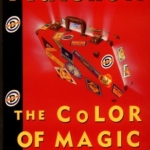
Welcome to the Book Bonfire, where everything is made up and the books don’t matter! Oh boy, do I have a treat for you today, my fine, feathered friends. I’ve decided to tackle Kurt Vonnegut’s bibliography in chronological order, starting with the early-installment-weirdness of Player Piano. Yes, that’s right. Player Piano. You’ve never read it, but I have! And I quite enjoyed most of it. Some of it was kind of meh, but the dude wrote this in his twenties. Haven’t you ever read other books by people in their twenties? No, you haven’t. Nobody writes books in their twenties. It has never happened. Except now, with Player Piano. You following me here?
No? Good. This book covers the well-worn topic of machines taking jobs away from people. It doesn’t involve death robots or anything like that, although that would be pretty sweet. Instead, it focuses on the high-and-mighty and indispensable — by design, not necessarily in reality — job positions of engineers and managers and how they’re the ones sitting on the pedestal while technicians, secretaries, and various other low-paying jobs can be replaced with automatons. Never do they actually focus on the machines. In fact, nearly the whole book follows the journey of Doctor Paul Proteus, engineer and manager, as he becomes disillusioned with the progression of technology to the point of sabotage. Pushed to the point of midlife crisis, Paul rethinks his life as an elite member of this dystopian society and yearns for a simpler existence. A simpler existence not just for him, but for society in general. Far out, man.
– Paul
People always say that Vonnegut’s works foretold an accurate depiction of the future. Well, his future at any rate. This was written in 1952, amazingly, but it doesn’t feel that old. The idea of machines replacing basic human technical jobs is a reality now and has (as does) threatened many industrial workers’ livings. Player Piano takes the idea of progress and treats it as the Big Bad in of itself. By the end of the book, all the engineers and managers who were part of the revolution to overthrow progress are happily considering a life without technology at all. They discuss wood-burning stoves and ice boxes… until the group decides to rebuild and refurbish a broken, old “Orange-O” drink machine, hinting at these peoples’ inherent drive to fix, improve, and progress. It’s this knowledge that causes the Ghost Shirt Society members (and semi-unwilling member Paul) to turn themselves into the authorities. It was worth a try!
I’m by no means a manager, but I am an engineer, and I spent a lot of this book sympathizing with Paul as he becomes increasingly disengaged from his job. My favorite part of Player Piano is when Paul is appointed captain of a team-building retreat group (“Blue!”) and needs to pretend to give a shit. It’s at this point where Paul musters up the strength to quit, but instead gets haplessly roped up into a conspiracy to overthrow the Ghost Shirt Society beyond his control. This is the stuff that reminds me of Hitchhiker’s Guide to the Galaxy or Discworld, where human characters are thrown into these absurd situations. It was like this:
“You’re our man, Proteus!” said Kroner.
“I’m your man,” Paul replied gloomily.
Love that shit.
BOOK BONFIRE DISCUSSION QUESTIONS!
Compare technology in the future society that Kurt Vonnegut imagined in 1952 to today’s technology.
– Paul
There’s a very amusing scene where Paul Proteus is challenged to a checkers match during a company party. Paul, apparently, is the undisputed checkers champion of upstate New York! And some young up-and-coming piece of shit engineer named Fred Berringer has brought with him a giant refrigerator of a computer named “Checker Charley”. Checker Charley can kick anyone’s ass at checkers, and we’re about to see poor Paul get his ass handed to him on a rose gold platter. At first, he doesn’t even want to try. Machines are infallible! He gets convinced to play, though, and play he does. The machine fails miserably. Chalked up to a faulty connection, the machine smokes and fizzles out as Paul wins the match. Everyone celebrates Paul’s triumph as man over machine (except for Berringer, who bitches and moans about his poor checkers-playing hunk of junk).
Checker Charley predates the development of Deep Blue by 35 years. Now, I’m not one to do “research” to prepare these godawful blog posts, but was there any kind of computer that was designed to compete in games before Deep Blue? If not, that’s impressive of Vonnegut’s part. Not to mention that artificial intelligence has gotten exponentially more sophisticated since even Deep Blue. I don’t have to tell you. You’re using a computer right now!
If the computer system could be improved so that everyone’s talents were measured truly and accurately, would the society portrayed in the novel be acceptable? Why or why not?
This is a tough one, because I can’t help but sometimes have the opinion that the world should be run by the smart, altruistic people and NOT the smart, selfish people. And ESPECIALLY not the dumb, selfish people. I mean, Jesus.
– Paul
So, if I count selflessness as a talent then yes, as long as everyone’s talents were measured truly and accurately then the world wouldn’t be run by the rich… well, that’s not true, since the highly talented would be rich as a result. And the poor and untalented would be despondent and possibly form a coup that will fail because they’re all dumb. Hmmm… and the rich and smart will ultimately become corrupted by the money and start euthanizing the dumb in order to create a super-race of intelligent human beings from eugenics and genocide.
You know what? Forget I said anything. Some alien should blow up the Earth and get it over with already.
FINAL THOUGHTS
I’ve read exactly eight other Vonnegut books in college, which was already way over a decade ago, so I don’t exactly remember the style that he ended up locking into and how it might be different from the early-installment weirdness of Player Piano. I was worried at first when Paul was jerking off about the whirring of machinery for 30 pages, but then the book picked up and maintained a steady, entertaining pace. That is, until it started falling apart near the end with the Ghost Shirt Society stuff. I didn’t like that too much! It seemed aggressively out of place compared to the soft sci-fi of the rest of the book.
But yes, this was very enjoyable. Vonnegut published this when he was 30! I’m quite a few years behind already on my first novel, entitled “The Mars Snakes vs. the Jupiter Snakes”. I don’t have to tell you who’s going to win the war!







Click here to ridicule this post!